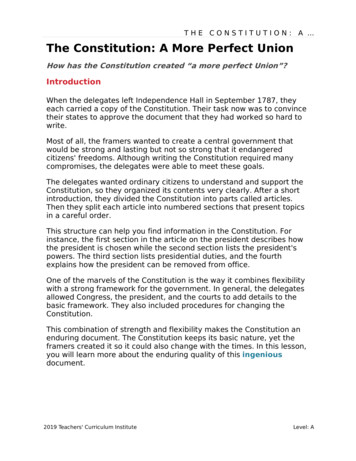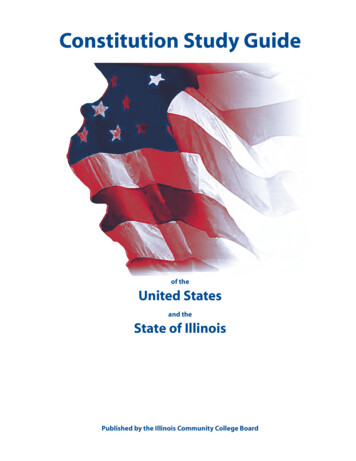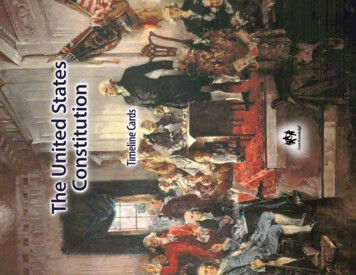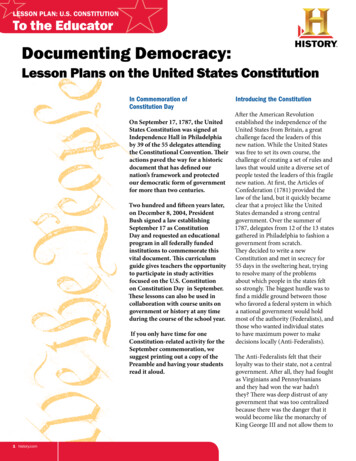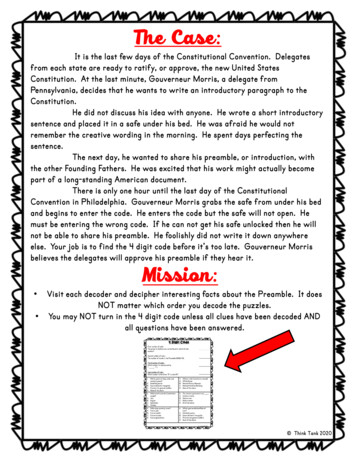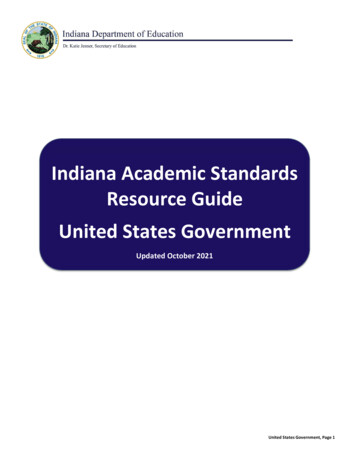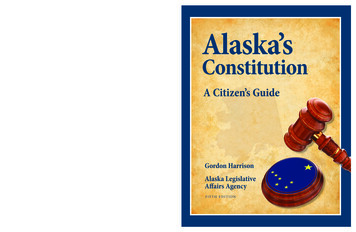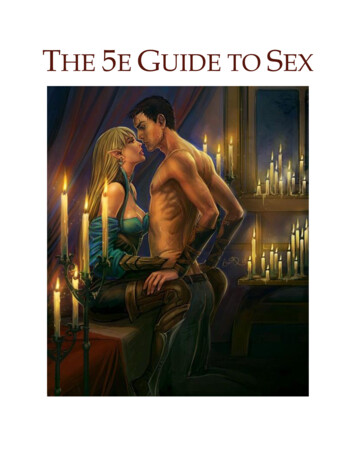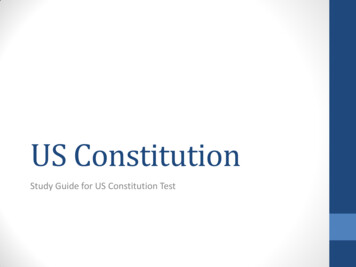
Transcription
US ConstitutionStudy Guide for US Constitution Test
Declaration of Independence:Influence on US Constitution Established natural rights (life,liberty, & pursuit of happiness) Established the concept ofpopular sovereignty (people arethe source of political power) Need for limited government Need for separation of powers Need for checks and balances Provided justification forrevolution against an unjustgovernment
Articles of Confederation:Influence on US Constitution Influenced concepts ofseparation of powers & checksand balances Articles of Confederation had noexecutive branch to enforce laws,nor a judicial branch to interpretthe laws
Weaknesses ofArticles of Confederation Constitution Fixes House of Reps determinedby population Establish power to tax Power to regulate trade Creates executive branchw/ one President Creates judicial branch tointerpret laws Creates amendmentprocess Simple majority (51%) ofBoth Houses to pass laws
Preamble to theConstitution Establishes the purpose of the USGovernment Form a more perfect unionEstablish justiceInsure domestic tranquilityProvide for common defensePromote the general welfareSecure the blessing of liberty With words, We the People, thepreamble establishes the concept ofpopular sovereignty (people are thesource of political power)
Magna Carta English Document whichestablished the followingfundamental rights Limited government (basisof US Constitution) Rule of law (governmentofficials are not above thelaw) Right to trial by jury (foundin Bill of Rights) Due process of law (found inBill of Rights) Protected against arbitrarytaking of life, liberty, andproperty
Significance of EnlightenmentWriters: Thomas Hobbes In state of nature, man is bornfree (people could take anythingthey want by force), as a resultwe must agree to give up certainrights in a social contract toensure peace (SOCIALCONTRACT THEORY) Such as the right to kill or steal
Significance of EnlightenmentWriters: John Locke Men are born free andequal, but as populationsgrew, laws were needed tokeep order, men agreed todelegate this function to agovernment, a socialcontract, with limitedpowers can be modified bythe people at any time(SOCIAL CONTRACTTHEORY)
Significance of EnlightenmentWriters: Jean Jacques Rousseau Mutual contract (socialcontract) between thepeoples and government People agree to be ruledonly so that their rights,property, and happiness beprotected by their rulers Once rulers break thecontract, the people are freeto choose another set ofrulers (basis for theDeclaration ofIndependence)
Significance of EnlightenmentWriters: Baron de Montesquieu Need for Separation ofPowers (legislative,executive, and judicialbranches of government) Importance of a fair andobjective judicial branch ofgovernment (to avoiddespotism resulting from afeeling of lacking equality)
Social Contract Theory The state arose out of avoluntary act of free people The state exists to serve thewill of the people People are the sole sourceof political power (popularsovereignty) People are free to give or towithhold the power as theychoose
Limited Government Basic principle of American system of government Government is restricted in what it may do, and eachindividual is has rights that the government cannot take away First established with the Magna Carta Rule of Law – government officials are to be held accountable fortheir actions (not above the law)
Separation of Powers Basic principle ofAmerican systemof government Executive,Legislative, andJudicial powersare dividedamong threeindependent andco-equal branchesof government Enhances conceptof limitedgovernment bydividing up thepower, to preventconcentration ofpower in oneindividual
Checks and Balances Basic principleof theAmericansystem ofgovernment System ofoverlappingpowers of thelegislative,executive, andjudicialbranches topermit eachbranch tocheck theactions of theothers
Rule of Law The government and its officers are always subject to the law First established by Magna Carta Said the King is not above the law
Federalism System of government in which a written constitution dividesthe power between a central government and several localgovernments – divides power between National (Federal),State and Local governments
Principles of American PoliticalCulture - Liberty Freedom – each person shallbe free to do as he or shechooses as long as it does notinterfere with the rights ofanother Freedom is NOT absolute Can’t say fire in a movietheater (if there is no fire) Can’t say bomb on anairplane (if there is no bomb)
Principles of American PoliticalCulture - Equality All people are entitled to equality of opportunity and equalitybefore the law
Principles of American Political Culture –Majority Rule / Minority Rights Although the majority hasthe right to rule or passlaws, they many not denythe rights of a minoritygroup
Principles of American PoliticalCulture: Necessity of Compromise To find the position that is most acceptable to the largestnumber of people by blending and adjusting competing viewsof interest
Principles of American PoliticalCulture: Diversity Each individual is unique and different and should be valuedfor their uniqueness May include differences in race, religion, ethnicity, gender,physical abilities, etc.
Bill Of Rights 1st Amendment: Freedom of Speech, Religion, Press, Assembly andPetition
Bill Of Rights 2nd Amendment: right to bear arms
Bill of Rights 3rd Amendment: No Quarter of Troops during times of peace.
Bill of Rights 4th Amendment: The right of the people against unreasonablesearch and seizures (must have warrant or probable cause).
Bill of Rights 5th Amendment: Criminal Proceedings (no self incrimination, no DoubleJeopardy (can’t be tried for same crime twice), Due Process and EminentDomain (gov’t can seize private property for public use – must paymarket value)
Bill of Rights 6th Amendment: Right to a speedy and public trial by an impartialjury.
Bill of Rights 7th Amendment: Right to a jury trial in civil matters in excess of 20.00.
Bill of Rights 8th Amendment: No Cruel and unusual punishment, nor excessivefines or bail.
Bill of Rights 9th Amendment: Any rights that are not specifically stated in theConstitution are held by the people.
Bill of Rights 10th Amendment: Powers not delegated to the U.S. by theConstitution, or are forbidden to the States, belong to the States orthe People of the States (Reserved Powers).
Formal Amendment Process Formal Amendments can bePROPOSED by: A 2/3 vote of both houses ofCongress At a national convention whencall by Congress whenrequested by 2/3 of the states Formal Amendments can beRATIFIED (approved) by: The State legislature of ¾ ofthe states Conventions held in ¾ of thestates Formal Amendment Processprovides for a way toaccommodate a changingsociety
The Supremacy Clause If national law and state law conflict, the national law will rule. McCulloch v. Maryland Supreme Court used Supremacy Clause to explain that the Stateof Maryland could not tax federal bank notes issued by the 2ndBank of the United States
Marbury v. Madison William Marbury was appointed to be ajudge for the District of Columbia byoutgoing Federalist President JohnAdams Incoming President Thomas Jeffersonwithdrew Marbury commission to thejudgeship Marbury filed suit in the Supreme Courtin an attempt to force Jefferson to givehim the judgeship, citing the NationalJudiciary Act of 1789 (allowing him totake his case directly to the SupremeCourt Established the Supreme Court’s powerof judicial review (declaring an act ofthe government unconstitutional) Struck down the National Judiciary Act of1789 as unconstitutional thereforenullifying Marbury’s case
McCulloch v. Maryland State of Maryland taxed the banknotes issued by the 2nd Bank ofthe United States State of Maryland claimed thatthe Federal Government doesnot have the authority to createa National Bank Supreme Court cited theNecessary and Proper Clause(Implied Powers) to suggest thatthe Federal Government doeshave the authority to create aNational Bank Supreme Court also cited theSupremacy Clause to suggestthat a conflict between a StateGovernment and the USConstitution would favor the USConstitution
Miranda v. Arizona Ernesto Miranda was convicted ofkidnapping and rape Miranda confessed during questioning,but was not read his rights Supreme Court overturned Miranda’sconviction, laying down the MIRANDARULE, which states that a suspect mustbe: Told of his or her right to remain silent Warned that anything he or she says canbe used in court Informed of right to an attorney If can’t afford one, court will provide one Can end questioning at any time
Plessy v. Ferguson Herman Plessy challenged aLouisiana law which requiredseparate seating for white andAfrican Americans on railroad cars Plessy cited the 14th Amendmentand stated that his Equal Protectionof Laws was violated Supreme Court ruled that as longas the facilities were SEPARATEBUT EQUAL (providing basis forlegal segregation and upholdingJim Crow Laws) Court ruled that 14th Amendmentonly gave African Americanspolitical and civil equality, not socialequality
Brown v. Board of Educationof Topeka Linda Brown, a 10 year oldTopeka girl was not permittedto attend her neighborhoodschool because she was anAfrican American Brown cited the EqualProtection Clause of the 14thAmendment Supreme Court overturned thePlessy v. Ferguson rulingstating that SEPARATE WASNOT EQUAL (makingsegregation of the racesillegal)
New Jersey v. T.L.O. T.L.O., a high school student deniedsmoking in the bathroom at school afterbeing observed by a staff person School Principal searched her purse andfound cigarettes, marijuana, and evidencethat she was dealing drugs at school T.L.O. argued that it was an illegal searchviolating the 4th Amendment Supreme Court ruled that the school hada legitimate need to maintain a properlearning environment for students whichrequires an easing of the search andseizure requirements that would benecessary outside school grounds(reason suspicion is necessary instead ofprobable cause)
Suffrage Amendments 15th Amendment (AfricanAmerican Suffrage) Right to vote could not bedenied based on race, color, orprevious condition of servitude 19th Amendment (Women’sSuffrage) Right to vote could not bedenied based on gender
Civil Rights Acts Civil Rights Act of 1964 No person may be denied access orrefused service in publicaccommodations Prohibits discrimination in any programthat receives federal funds Forbids employers and labor unions todiscriminate against any person on thegrounds of race, color, religion, sex,physical disability, or age in job relatedmatters Civil Rights Act of 1968 Open Housing Act – forbids anyone fromrefusing to sell or rent to anyone on thegrounds of race, color, religion, nationalorigin, sex, or disability
Voting Rights Act of 1965 Finally made the 15th Amendment effective by applying it ALLelections (federal, state, and local) Encouraged court challenges of poll taxes Suspended use of literacy tests as a voting requirement
Reserved Powers Powers that the Constitution does not grant to the NationalGovernment, nor are denied to the state Examples include: Regulate trade within the state Pass licensing requirements for professionals (teachers, realestate agents, doctors, etc.) Regulate alcoholic beverages Conduct Elections Establishing public schools Setting graduation requirements Establish local governments Marriage and divorce laws Land use laws
Concurrent Powers Powers that are shared byboth the NationalGovernment and the StateGovernments Examples include: Levy and collect taxesBorrow moneyEstablish courtsDefine crimes andpunishments Claim private property forpublic use (eminentdomain)
Exclusive Powers Powers that can be exercised ONLY by the NationalGovernment Examples include: Coin moneyMake treaties w/ foreign statesTax importsRegulate interstate commerceRaise and maintain armed forcesDeclare warGovern US territoriesConduct foreign relations
Expressed Powers Powers delegated to the National Government (clearly writteninto the US Constitution Examples include: Power to taxCoin moneyRegulate foreign and interstate tradeRaise and maintain armed forcesFix standards of weights and measuresGrant patents and copyrights
Implied Powers Powers that not expressly stated in the USConstitution, but are reasonably suggested orimplied by the expressed powers Based on the Necessary and Proper Clause(Elastic Clause) which states that theCongress has the power to do anything that isnecessary and proper for carrying out theexpressed powers Examples include: Punish tax evadersAcquiring new territoriesAlcohol and drug lawsSetting crime and punishmentBuilding of interstate highway systemProhibiting racial discriminationetc.
Inherent Powers Powers that belong to the NationalGovernment because it is thegovernment of a sovereign state inthe world community Examples include: Regulate immigrationDeporting illegal immigrantsAcquire territoryGrant diplomatic recognition toother states Protect nation from rebellion
Qualifications for President Must be 35 years old Must be a natural born citizen Must have lived in the United States for 14 years
Order of Successionto President 25th Amendment States Vice President willtake over for the Presidentupon the death, removal, orresignation of the President Presidential Succession Actof 1947 Fixes the order ofsuccession to the President Vice President Speaker of the House President pro Tempore ofthe Senate Secretary of State
22nd Amendment No president may be electedto more than 2 terms ofoffice No president may serve morethan 10 years in office If you serve 2 years or lessas President due to thedeath, resignation , orremoval of a President, youwould be eligible to serve 2more terms If you serve more than 2years as President due tothe death, resignation, orremoval of a President, youwould only be eligible toserve 1 more term
Presidential Appointments andProcess President has power toappoint ambassadors,Cabinet members, heads ofindependent agencies, allfederal judges, US Marshals,US Attorneys, all officers ofthe armed forces (withSENATE approval) Process President nominates Senate Judiciary CommitteeHolds Hearings Senate Debates Senate Votes to Confirm orReject
Powers Granted to President Executive Powers Enforce (carry out) federallaw Ordinance Powers Issue executive orders(directive, rule, or regulationthat has the effect of law –without Congressionalapproval) Removal Powers President can remove anyappointed official EXCEPTfederal judges
Executive Branch: ForeignPolicy (Diplomatic Powers) President may negotiate Treaties w/foreign governments – must have 2/3vote of Senate for approval President may negotiate an ExecutiveAgreement with a foreign head of state(NO SENATE APPROVAL NEEDED) Commander in Chief of Armed Forces How foreign policy powers are sharedwith Congress Treaties (requires Senate Approval Foreign aid (Congress controlsspending) War powers (Congress declares warand must approve any military actionover 60 days – War Powers Resolutionof 1973) Appointment of Ambassadors toforeign nations (requires Senateapproval)
President’s Judicial Powers Appointment of Federal Judges Power to Grant Pardons,Reprieves, Commutations,Clemency, Amnesty Pardon – legal forgiveness for acrime Reprieve – delay of justice (ex./delay of death penalty) Commutations – shorten asentence Clemency – leniency Amnesty – pardon of a largegroup of law violators
President’s Legislative Powers Recommend LegislationSign or Veto BillsPropose Federal BudgetCall Special Sessions of Congress
Basis for Representation inHouse and Senate House ofRepresentatives Apportioned(distributed) tostates based onpopulation Senate Each statereceives 2Senators
Process of How a BillBecomes a Law Bill is introduced in either house of CongressReferred to standing committeeReferred to sub-committee hearingsDebated on FloorVoted onIf bill passes one chamber, it is sent to the other chamber whereprocess starts over If bill passes both chambers, it is sent to conference committee towork out differences in bills, creating a new bill, which must bevoted on again by both chambers of Congress (needs a simplemajority to pass) Bill sent to President who can sign it into law, veto it and send it back(can be over-ridden with a 2/3 vote), not sign it within 10 daysmaking it a law, or pocket veto (not sign and if Congress adjournswithin 10 days the bill dies)
Role of Committees in LawMaking Process Divide up workload Most of work done inStanding Committees(Budget Committee,Armed ServicesCommittee, etc.) Inform voters Investigative Powers Ex./ Steroids inProfessional Sports
US House of RepresentativesLeadership Positions Speaker of the House Presides over House of Representatives Decides which bills will be introduced and debated House Majority Leader Leader of the Majority Party (Party which holds most seats inHouse) House Minority Leader Leader of the Minority Party (Party which holds minority status inthe House) House Majority Whip Responsible for counting votes for the Majority Party House Minority Whip Responsible for counting votes for the Minority Party
US Senate Leadership Positions President of the Senate Vice President of the United States Votes to break a tie (cannot debate or vote otherwise) President pro Tempore of the Senate Presides in absence of the President of the Senate Senate Majority Leader Leader of the Party which has the most Senators Senate Minority Leader Leader of the Party which has minority status in the Senate Senate Majority Whip Responsible for counting the vote for the majority Party Senate Minority Whip Responsible for counting the votes for the minority Party
System of Checks and Balances
Powers Granted ONLYto US Senate Approval or Rejection of Presidential Appointments (federaljudges, cabinet members, ambassadors, etc.) Approval or Rejection of Treaties
Jurisdiction Jurisdiction - authorityto hear a case Original Jurisdiction –authority to hear a casefirst US District Court & USSupreme Court Appellate Jurisdiction US Court of Appeals &US Supreme Court
Due Process of Law The government cannotarbitrarily deny your right tolife, liberty, or property Government must followestablished rules and treat allpeople fairly Found in 5th and 14thAmendments Applies in Eminent DomainCases (Government takingprivate property for public use)
Judicial Selection Process President appointsnominees Senate Judiciary Committeeholds Hearings Senate Debates nominees Senate Votes to confirm orreject nominee
Sources of US GovernmentRevenue Individual Income Tax (Largest Source of US GovernmentRevenue) CorporateIncome Tax Sale ofGovernmentLands
Electoral System of Electing thePresident Presidential Election is decidedby the vote of the ElectoralCollege Each states # of electors isdetermined by their number ofRepresentatives Senators Must have a majority ofelectoral votes (270 votes)
Flaws in the Electoral Systemof Electing the President Winner of popular vote can lose the election Electors are not required to vote in accord with the popularvote The House of Representatives would select the President inthe case of a tie
War Powers of the President President is Commander in Chief ofArmed Forces War Powers Resolution of 1973 President must notify Congress within 48Hours of committing troops abroad President can send troops for 60 days(unless Congress authorizes an extendeduse of forces) – has 30 more days to bringtroops home safely Congress can end the use forces at anytime by passing a concurrent resolution President DOES NOT have the power todeclare war (this power is held byCongress)
Role of Congress inUS Fiscal Policy Congress approves the United States Government Budget Congress authorizes appropriation of money (governmentfunding)
How May Individual RightsConflict with the Common Good? Majority Rules / Minority Rights Although the majority has enough power to pass laws, they mustdo so while respecting the rights of the minority group Ex./ Although the majority of Americans are white, they cannot passlaws that discriminate against minority groups (African Americans,Hispanics, Native Americans, etc.) Limitations to your 1st Amendment Rights You cannot exercise your rights in a way that infringes upon therights of others Ex./ Your freedom of religion would not protect a religious belief ofhuman sacrifice
Eminent Domain Government may seizeprivate property forpublic use (must paymarket value forproperty) 5th Amendment
Constitution Establishes the purpose of the US Government Form a more perfect union Establish justice Insure domestic tranquility Provide for common defense Promote the general welfare Secure the blessing of liberty With words, We the People, the preamble estab
